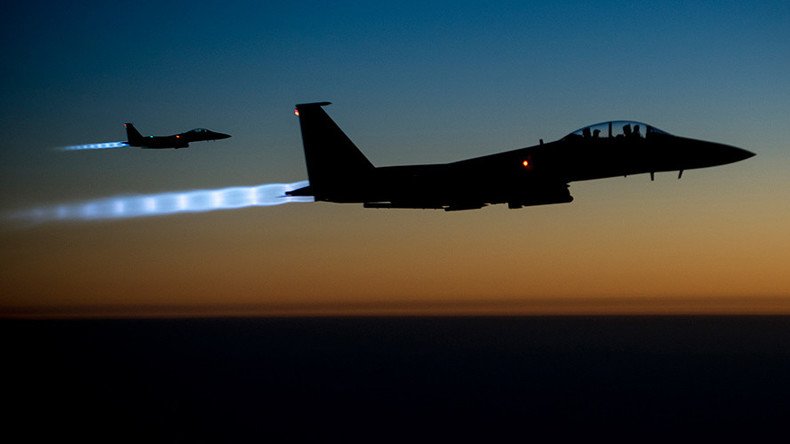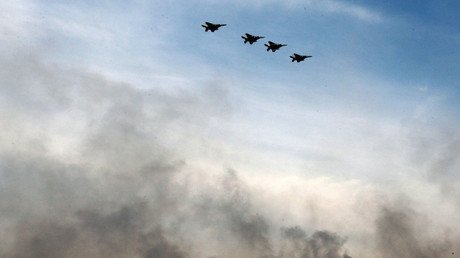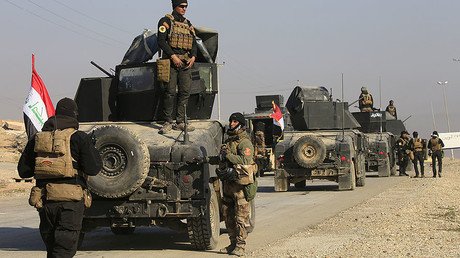Trump plan to tame Syria’s ‘moderate’ fighters will backfire – the neocons are banking on it

There isn’t much positive to report from Trump’s battle with extremists in Syria, as their ranks appear to be swelling following his latest banal initiative. Or is this part of a greater plan to negotiate with Russia and Assad from a position of strength?
Henry Kissinger once wrote: “the conventional army loses if it does not win. The guerrilla wins if he does not lose.” Perhaps Donald Trump should draw some solace from this statement, which applies to Syria even today. Perhaps it didn't come as a surprise when Trump withdrew US funding to the Free Syrian Army (FSA) ‘rebels’ who fight, amongst others, the Assad regime forces? Some are quick to point out that he wants to stop funding terrorist groups who may well clash with Assad – but are also seen to be in part the progeny of ISIS – who, to complicate matters further, also fight the Kurds.
According to reports this week, Trump wants to encourage the FSA to consolidate under one umbrella, as he believes that some of its members are passing on weapons to the extremists.
It’s what Trump does. He likes to make everything binary, whether it’s Muslims or non-Muslims, Iran (Shias) and Gulf Arabs (Sunnis), or ‘fake news’ vs. news outlets which report “alternative facts” the way he prefers them to be viewed, which we saw just recently with the White House ban on outlets he wishes to punish.
It’s all about simplifying and then galvanizing control. If these rebels can be controlled more, then they will receive backing with heavier weapons. If not, they should suffer. There is some truth after all in the argument that the FSA since 2015 “fell apart,” but whose fighters have been kept on the pay roll more for a PR stunt to propagate disinformation, largely with regime change in mind.
So, either getting them in line, or getting rid of them, sounds prudent, no? Not quite.
In Syria, many of these so-called ‘moderate’ opposition fighters are out of control and no one even knows who they are fighting; some, like the FSA, take their orders from Turkey, which has presented itself with a new conundrum: how can the US support them when they are fighting the Kurds which it also backs? Who, for example, will be involved in the final push for Raqqa, the ISIS epicenter of cruelty and extremism on a biblical scale, which has seen its numbers of fighters swell after it was alleged that America allowed them to leave through ‘rat lines’ in Mosul, in neighboring Iraq?
And now, following the news that he is asking them to choose between his way or receive no more funding, many are now turning to Al-Qaeda – and because of this, the key town of Idlib in northern Syria has been strengthened as an extremist citadel. Perhaps the smart question is not whether this was his intention, but what the long-term implications are. It’s not clear. But with mere days in office, it sets a new precedent of insanity that Trump’s ideas have already aided the terrorists that he apparently wishes to destroy.
Is anyone advising him on who is who in the Syrian war?
And given his propensity to take everything personally and absorb himself in matters which are more about his own foibles and vanity (like his approval ratings), no one can tell what his real strategy regarding Syria and Iran is. It’s not only Russia which is growing increasingly curious as to what his ‘safe zones’ plan in Syria entails (no-fly zone for Assad regime and Russia fighters?), but also his partners in the region, Saudi Arabia, UAE, Qatar, and Turkey.
The rulers of these countries are waiting to see if he is genuinely ready to work with Russia in Syria to hammer out a real peace deal – which both destroys ISIS and protects civilians trapped in many of these conflict zones; or indeed, if Trump aims to garner support from them so as to present his safe zones plan as an ultimatum to Putin, negotiating from a position of strength a deeper, more calculating gambit: regime change.
They are waiting to see what their role over the safe zones is (providing troops on the ground to protect such areas?) and whether their air forces will be prepared to support US policy against Iran, if and when the bell tolls.
Everyone is waiting to read the fine print of James Mattis’ report on how to destroy ISIS, due to be published in about 10 days. More over-simplification. As if all it will take is for a report to be written to end a war which has been fought by so many proxies that most regional experts can’t even keep up with who’s fighting who most days.
'Keep the oil, but let us win Mosul'
In the meantime, Trump is playing at regional politics. He is learning fast that it’s not all about taking. Crucially last week, Mattis, his chosen defense secretary, was in Iraq. The former marine was reportedly there to assure Iraqis that the US was not there to take the oil.
But Iraqis will watch Mattis like a hawk now, as his word will be critical for future deals. He promised that he would look into getting Iraqis who worked for the US Army off the so-called ‘Muslim ban list,’ while he ordered 60 or more US soldiers to fight from the front line.
Mattis’ visit came a day after Iraqi Prime Minister Haider al-Abadi announced the start of a ground offensive on western Mosul, where ISIS fighters are under siege along with around half a million civilians.
Crucial to Trump’s plans is to take Iraq back away from Iran’s influence, which is why the statements from Mattis all chimed with US troops bedding in for a long time in Iraq – a statement which most western journalists missed the nuances of, but which was aimed at influential Shi'ite cleric Moqtada al-Sadr, who earlier called on Iraq’s government to order the withdrawal of US and allied forces after the battle of Mosul is over.
Sending US troops to the front lines in Mosul is about showing the Iraqi PM that America stands by him. But it also serves as a litmus test for the American public and a hint of things to come in Syria: more US troops fighting, albeit nowhere near the numbers of the Gulf Wars but more, nonetheless.
It's uncanny how, despite Trump appearing to be original in his approach to office – disregarding all protocol, analysis from experts, and hard evidence – that he ultimately follows the path of other US presidents in the Middle East by looking at the dynamics of the region’s problems through a military perspective.
It’s hard to see how the quagmire of Syria will spare him.
Others in US politics don’t blame Trump for his foreign policy forays, but the system in America which produced him.
The American film director Oliver Stone, when receiving an award recently, said that “in the 13 wars we’ve started over the last 30 years and the $14 trillion we’ve spent, and the hundreds of thousands of lives that have perished from this earth, remember that it wasn’t one leader, but a system, both Republican and Democrat.”
Niraj Srivastava, the former ambassador of India, writing in 21stcenturywire.com, quotes Stone to compound the point that it will also be the system which takes him down.
Srivastava argues that the ‘deep state’ in America is pleased that relations between the US and Russia have soured, and that it is planning to remove Trump from office.
Russia talk is FAKE NEWS put out by the Dems, and played up by the media, in order to mask the big election defeat and the illegal leaks!
— Donald J. Trump (@realDonaldTrump) February 26, 2017
He says that his ‘safe zones’ plan in Syria and the return of Crimea by Russia to Ukraine are entirely beyond negotiation. “These demands will only increase the friction between the two countries, which is what the neocons want – an adversary in whose name the US/NATO war machine can continue to work,” Srivastava writes.
“Otherwise, what would be the justification for the continued existence of NATO?”
If Trump himself realizes this, then his speed makes sense. The waiting game is not so much what will Trump’s move be in Syria with Russia, or when he will bomb Iran. Or whether his plan for US soldiers to fight in Syria is plausible. It is whether he will really have the time before the media, the deep state, and the republicans will lunge at him, like Caesar in the Senate.
Martin Jay recently won the UN’s prestigious Elizabeth Neuffer Memorial Prize (UNCA) in New York for his journalism work in the Middle East. He is based in Beirut and can be followed at @MartinRJay
The statements, views and opinions expressed in this column are solely those of the author and do not necessarily represent those of RT.















